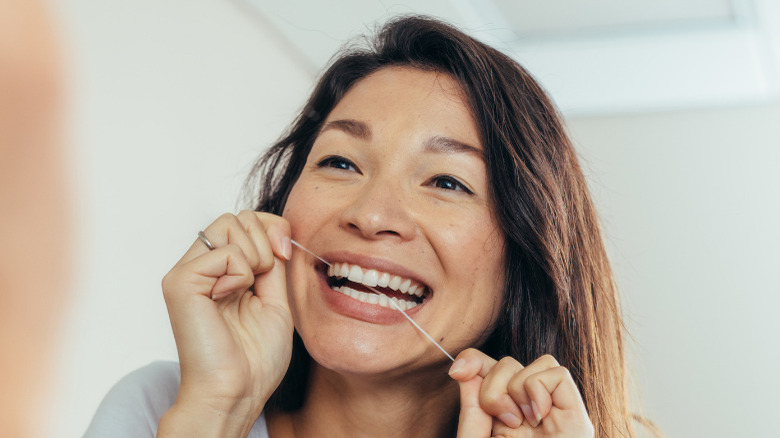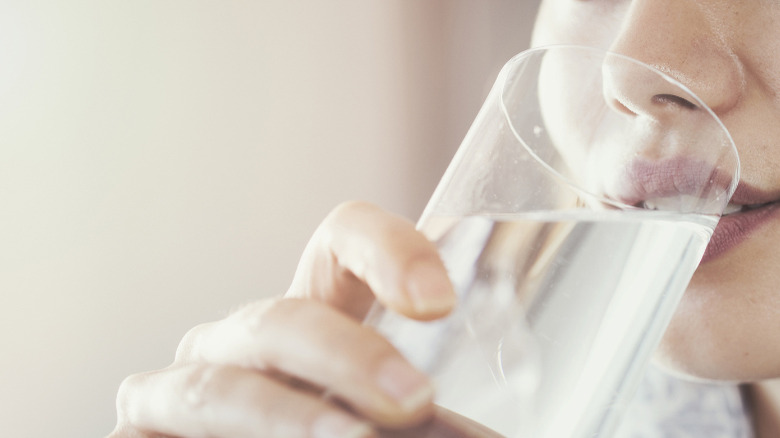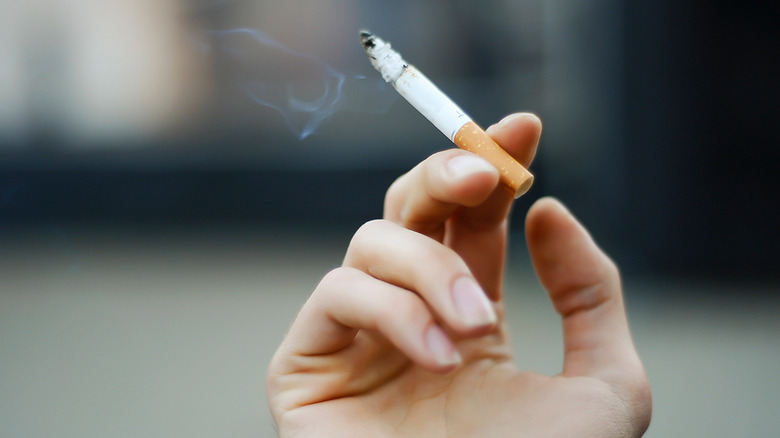Unhealthy Habits You Need To Ditch Before You Turn 40 Gallery
Changing bad habits takes work
Bad habits are easy to catch and hard to get rid of. Chances are you've accrued at least a few in the highs and lows of your 20s — especially in college. Back then, you weren't all that worried about the consequences of your questionable decisions. You stayed out late, ate too many packets of ramen, and probably didn't always prioritize your health over other important aspects of your life.
All that's well and fine — I mean, if you always prioritized your health, you'd have missed out on all the friendships from late-night pizza runs and experiences from making mistakes along the way.
But now that you're nearing 40, you might be thinking that it's time to take a step back and assess what changes need to be made. Once you turn 40, some say there are life rules that become OK to break. But on the flip side, there are things you may have let slide in your younger days that are a good idea to stop ASAP. You're always changing, so why not continue to better yourself? Now's as good a time as any to make some healthy life changes to make this chapter of your life feel even better than the last. These are the unhealthy habits that you need to ditch before your 40th birthday.
Crash Dieting
If you're going on a beach vacation or have a cruise coming up, you might be tempted to go on a diet to try to shed some last-minute pounds. But even if it helps you lose weight in the short term, crash dieting is a really bad idea. According to the Obesity Action Coalition, some risks of crash dieting include poor nutrition, gallstones, dehydration, hair loss, and abnormal heart rate. These extreme diets can also wreak havoc on your metabolism, which is already slowing down as you age.
Sitting All Day
According to the Mayo Clinic, studies show that sitting all day can be as detrimental to your mortality risk as smoking. You don't have to do high-intensity exercise or go running to stay active and fit — even just taking some time to walk or stretch can work wonders on your overall mood and health.
Never Reading Books
We know how easy Netflix has made it for you to just skip to the movie version, but you should really take the time to read. (Twitter doesn't count!) Curl up with a good book now and then to keep your brain sharp and stave off Alzheimer's and other forms of brain degeneration. We know, we know, you're too young to be worried about Alzheimer's — but making reading into a habit now is a good idea if you want to keep it up later in life.
Eating a Low-Fat Diet
The time for low-fat cheeses and yogurts is over. This might surprise you, but fatty foods have a number of health benefits that you don't want to miss out on. One of the strongest warriors against Alzheimer's and other forms of brain degeneration is eating fat. Olive oil, salmon, nuts, and avocados have all been linked to better cognitive function. All fats, even the saturated kinds, can help keep your cholesterol down and actually help you live longer.
Relying on Artificial Sweeteners
Friends don't let friends put Splenda in their coffee — not at this age, anyway. Some artificial sweeteners can increase your risk of Type 2 diabetes. Instead of artificial sweeteners, try jazzing up your coffee with one of these healthy alternatives.
Staying Up Too Late
If you can sleep in until the early hours of the afternoon, more power to you. But if you're like the rest of society and have to report to a day job or other commitment, staying up late could really cost you. Your body needs sleep like it needs to breathe; the health effects of sleep deprivation are actually pretty disturbing. If you're nearing 40, getting on a regular and sufficient sleep schedule is past due. If you have trouble falling asleep once you're in bed, try one of these bedtime rituals to help you snooze faster.
Skipping Meals
Think you've found a smart solution for skimping on calories? Think again. When you skip even one meal, it can wreak havoc on your body. Your metabolism will drop and your blood sugar fluctuates. Nearly two-thirds of adults with diabetes get diagnosed between ages 40 and 64, and your metabolism is already undergoing changes as you age. Do your body a favor and eat consistently throughout the day.
Avoiding Dairy
Unless you're allergic or intolerant to dairy, avoiding it is probably not the healthy solution you think. Dairy products are one of the main dietary sources of calcium in the modern American diet; calcium intake is especially important leading up to your 40s. Your bone mass starts to decline in your mid-30s, and if you don't supplement your bone health with enough calcium, you could be at greater risk for osteoporosis or fractures.
Neglecting to Rest
We know you have a lot on your plate. But take some time now and then to destress and relax. Stress might feel like it's fraying at your nerve endings, but it really is wearing away at you. Health consequences of feeling too stressed over time include insomnia, a weakened immune system, increased heart risk, and more. Don't go getting all stressed about stress now — just kick these bad habits that could worsen your anxiety and take some time to chill.
Never Flossing
Your dentist wasn't just messing around when he or she told you it's important to floss. You probably won't get a sticker or a lollipop as a reward anymore during your visit, but you should still feel proud when your dentist tells you that you're doing a good job flossing between your teeth. Gum disease usually appears when people are in their 30s and 40s; get into the habit before then to protect your beautiful smile!
Never Stretching After Exercise
Stretching keeps your muscles flexible, strong, and healthy, helping to preserve your range of motion and ability well into your old age. You don't want to fast-forward 20 years and find yourself in a wheelchair because of an injury. Keep your joints mobile and taken care of by always stretching after your workouts.
Counting Calories
As you age, your metabolism fluctuates. There's a very real possibility it will slow down, as you continue to count the same number of calories for a different metabolic rate. Since your metabolism is what determines how much energy from the food you need daily — and your metabolism is changing unpredictably — counting calories makes no sense. A better bet is listening and responding to your hunger cues.
Cutting Carbs
Fiber is an absolute must for anyone over 40. Most women require between 25 and 30 grams of soluble fiber every day to help lower cholesterol. These soluble fibers are often consumed in carbs — whole grains such as bread, pasta, and oats are rich with them and should be consumed liberally. Cut the carbs and you'll miss out, and probably feel really tired.
Binge Drinking
We hate to break it to you, but you're not in college anymore. You've probably toned down your drinking at least a bit since then, if not for health reasons then at least because your hangovers have gotten so much worse. Binge drinking is characterized as consuming 4 or more drinks for women and 5 or more drinks for men in the span of two hours. Most people who binge drink are not alcohol dependent, according to the Centers for Disease Control and Prevention, so they may not think it's a problem. But even consuming more than five drinks in one week can shave hours from your life.
Eating Canned Foods
Beans and vegetables are a must for your diet — but look for dry, uncooked beans and buy your vegetables fresh. Canned versions of these super-healthy foods are soaked in sodium and bisphenol A (BPA). Sodium can really hike up your blood pressure. And don't even get us started on the harmful implications of BPA chemicals in can linings.
Drinking Lots of Soda
Soda has zero nutritional value whatsoever — but it does have tons of sugar and sodium. Overdoing it on soda can put you at risk for diabetes, heart disease, and other chronic conditions, according to the Harvard School of Public Health. Choosing diet soda to avoid sugar might not be a great idea, either. Drinking diet soda can have some upsetting health effects of its own.
Not Drinking Enough Water
Many people are so focused on dietary interventions for their health that they neglect to use one of their most powerful tools for preventing health problems: water. Watch out for these telltale signs of dehydration and make sure you hydrate effectively. Drinking water helps to regulate your digestion, aiding in the absorption of nutrients. Water is also used in many of the body's basic functions; hydration helps to keep your organs running smoothly. As for how much water you should drink, we asked 10 nutritionists, and here's what they had to say.
Relying on Supplements for Your Vitamins
Think a multivitamin is powerful enough to replace your vegetables? Think again. Supplements aren't regulated by the Food and Drug Administration, meaning that it might not be smart to rely on their claims. Even if the supplements do contain the nutrition they claim to, Harvard Medical School advises that nutrients are most potent when they come from your food (via Nutrition Faktory). As you get older, it's crucial you get the vitamins and minerals you need to keep your organs in tip-top shape. Having a diet that's low in nutrition can increase your risk of a nutrient deficiency and other diseases.
Smoking
There's no wrong time to ditch your smoking habit. But if you're nearing 40, it's definitely time to quit. After just one day of nixing cigarettes, your risk of a heart attack begins to drop. After a year, your risk of a heart attack is cut in half. Considering all the other age-related factors that increase health risks to your heart, you don't want to add the additional strain to your system.
Not Washing Your Hands Enough
Don't be gross — wash your hands regularly, most importantly before you eat or after you've been on public transportation. The risk of coming into contact with germs is very real. As you get older, your immune system begins to weaken. Infections such as E. coli or strep become more dangerous and are more likely to be deadly when your immune system is weakened. The Centers for Disease Control and Prevention estimates that hand-washing could reduce diarrheal disease-associated deaths by up to 50 percent. Hand-washing is also your number one line of defense against food poisoning.
Never Going to the Doctor
People often neglect to keep up with their preventative health care, ignoring serious symptoms because they seem benign. The sooner you catch a health problem, the better. Visit your doctor regularly so he or she can keep tabs on your basic symptoms such as cholesterol, blood pressure, and lung health. Your likelihood of disease has a serious uptick once you hit 40, so getting into the habit of visiting your primary care doctor in your 30s is essential.
Forgetting Sunscreen
When you don't wear sunblock, you're risking more than just wrinkles. Sunburns can significantly increase your risk of skin cancer, which is why most dermatologists recommend wearing sunscreen every single day. Hopefully you at least apply a layer before sitting out in the sun, but most people forget to put it on before these other occasions when you could be at risk.
Neglecting Skin Care
It's the largest organ in your body and the one that you're least likely to take care of — your skin can benefit hugely from just a couple of minutes of TLC each day. Wash your face before you go to bed and first thing in the morning and make sure you use moisturizer if your skin is feeling dry. You might also want to start eating more of these foods that help support your skin health and prevent wrinkles.























